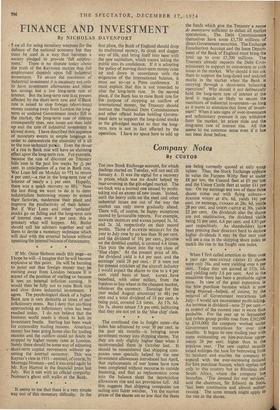FINANCE AND INVESTMENT'
By NICHOLAS DAVENPORT / I AM all for using monetary weapons for the defence of the national economy but they must be used in a way that becomes a society pledged to provide 'full employ- ment.' There is no dispute today about the truth of the Keynsian maxim that full employment depends upon full industrial investment. To secure the maximum of industrial investment it is necessary not only to have investment allowances and other tax savings but a low long-term rate of interest. But the long-term rate is at present affected by the short-term rate and if Bank rate is raised to stop foreign (short-term) money running away from London the long- term or undated Government stocks fall in the Market, the long-term rate of interest consequently rises, new issues are then held up and the rate of industrial investment is slowed down. I have described this sequence of monetary events in simple language in order to demonstrate the absurdity of it all to the non-technical puliic. Even the threat of a rise in Bank rate will have an alarming effect upon the long-term rate. For example, because the rate of discount on Treasury bills rose in the past few weeks by .% per cent. in anticipation of a rise in Bank rate, War Loan fell on Monday to Q7I to return 4 per cent.—a rise in the long-term rate of interest of nearly a per cent. Happily, there was a quick recovery to 881. Now the last thing we want to do is to deter industrialists borrowing money to extend their factories, modernise their plant and improve the productivity of their labour. But if War Loan and other 'undated' stocks go on falling and the long-term rate of interest rises over 4 per cent. this is precisely what will happen. Mr. Butler should call his advisers together and tell them to devise a monetary technique which will deal with the external balance without upsetting the internal balance of the economy.
•
If Mr. Oscar Hobson reads this page—as I hope he will—I imagine that he will become explosive at this point. He will be bursting to point out that foreign money may be running away from London because it is scared of the position of sterling or because it sees an internal inflation coming. It would then be folly not to raise Bank rate and slow down industrial investment. I agree. The_ psychological shock of a higher Bank rate is very desirable at times of real inflationary stress. But I deny that anything approaching an inflationary crisis has been reached today. I do not believe that the business world needs \a shock to halt its investment bustle. Sterling has been weak for commodity trading reasons. American money has been going home also for trading reasons and the outflow could no doubt be stopped by higher money rates in London. Surely there should be some way of adjusting . short-term capital movements without up- setting the internal economy. This was Keynes's view in 1931—resisted, of course, by Montagu Norman—and it was aired again by Mr. Roy Harrod in the financial press last July. But it met with no official sympathy.
' Norman's ghost still walks at the Bank.
• •
It seems to me that there is a very simple way out of this monetary difficulty. In the first place, the Bank of England should drop its traditional secrecy, its cloak and dagger way of life, and bring itself into tune with the new capitalism, which means taking the public into its confidence. If it is adopting the policy of moving short-term money rates up and down in accordance with the exigencies of the international balance, it must say so—at a Press conference. It must explain that this is not intended to alter the long-term rate. In the second place, if the Bank has to raise Bank rate for the purpose of stopping an outflow of international money, the Treasury should instruct the National Debt Commissioners and other official bodies holding Govern- ment debt to support the long-dated stocks in the gilt-edged market so that the long- term rate is not in fact affected by the operation. I have no space here to add up the funds which give the Treasury a masse de manoeuvre sufficient to defeat all. market speculation.. The Debt Commissioners themselves have some £3,750 millions of direct Government securities. The Exchange Equalisation Account and the Issue Depart- ment of the Bank of England must bring the total up to over £5,500 millions. The Treasury already requests the Debt Com- missioners to support its conversion or cash issues in the market. Why should it not ask them to support the long-dated and undated stocks in the market when "the Bank is carrying through a short-term balancing operation? Why should it not deliberately hold the long-term rate of interest at the level it regards as likely to secure the maximum of industrial investment—as long as it wants to stimulate that form of invest- ment? When it sees signs of over-investment and inflationary pressure it can withdraw from the market, let prices slide and the long-term rate of interest rise. All this seems to me common sense even if it has not been done before.


































 Previous page
Previous page